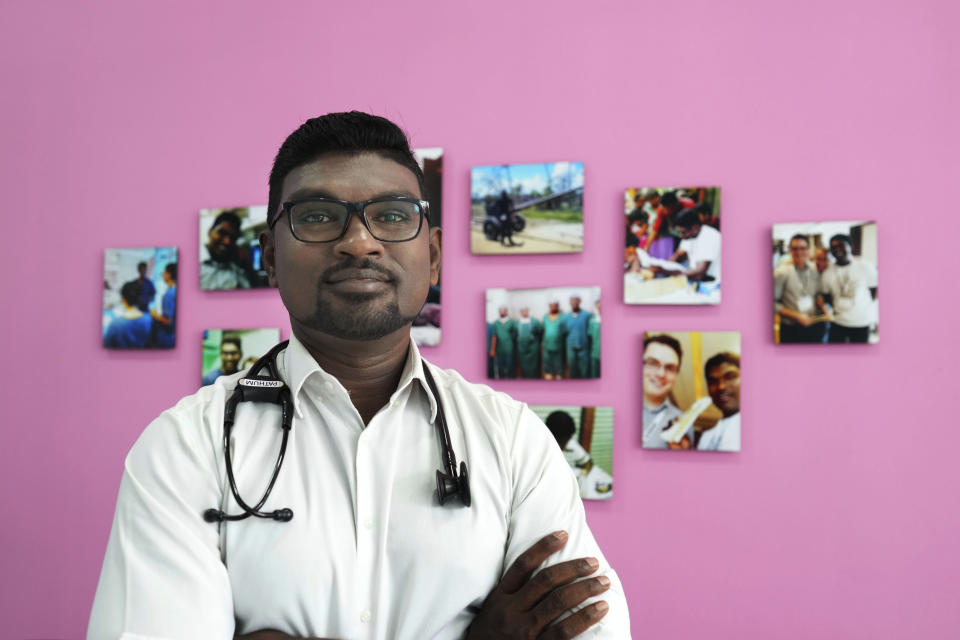Protests ousted Sri Lanka's last president. Ahead of new election, many are still waiting for change
COLOMBO, Sri Lanka (AP) — Two years ago, tens of thousands of Sri Lankans rose up against their president and forced him to flee the country. As the country prepares for its first election since then, many say they’re still waiting for change.
As Sri Lanka sank into economic collapse in 2022, people from various walks of life rallied to change a long-entrenched government they saw as responsible. The unprecedented island-wide public uprising they led was a moment of hope for the country long been fatigued by war and economic instability.
Days ahead of Saturday’s presidential election, many still complain of corrupt leaders, economic mismanagement, and the entrenched power of the political old guard, but former protesters are having a hard time coming together behind a candidate.
They agree on one thing: Sri Lanka needs a new political system that can take it out of economic and political turbulence.
Days after Rajapaksa fled the country, Sri Lanka’s parliament replaced him with then-prime minister Ranil Wickremensignhe in a vote that many protesters saw as a victory for the status quo.
Many Sri Lankans say the current government is largely made up of the same politicians who have ruled the island nation for decades through a devastating civil war that ended in 2009 to the economic crisis that began during the coronavirus pandemic.
Even though he was later jailed for seven days on charges of violence that saw Sri Lankan dissidents ransacking the presidential palace, 42-year-old physician Pathum Kerner said the protests achieved one goal: bringing in a new leader who could address the country’s economic woes.
The worst of the economic crisis is over, he says, but there’s still a long road ahead. “We wanted to create a new party, a new political culture, and emerging leaders, but we could not do that,” said Kerner, who joined the protests in their first days and helped to start the “Go Home, Gota” slogan that became a rallying cry for Rajapaksa’s foes.
Wickremensignhe has made progress steadying Sri Lanka’s economy, but discontent remains strong as he’s introduced economic policies that have raised the cost of living, like tax cuts and a debt restructuring program.
Meanwhile, many of the protest movement’s political demands remain unmet, from accountability from his predecessors for the economic crisis, to curtailment of president’s powers and a democratic replacement.
Ajantha Perera, an academic and scientist who was part of the protests, said she hoped at first that Wickremeisnghe would work with the protesters to find solutions to the crisis.
Instead, she said, the new president went after civil society leaders who were instrumental in the citizens’ movement, delayed local elections citing lack of funds, and protected the powerful Rajapaksa clan that had ruled Sri Lanka for more than 12 years.
“All of a sudden he turned into something totally different. He was trying to please the Rajapaksas who left,” Perera said.
Like many former protesters, she wants Sri Lanka to strip its presidency of most of its powers, moving them to a more powerful parliament and prime minister.
“Executive presidency is a white elephant for Sri Lanka,” she said, saying that any new president could use it to tighten their grip over the country. “We can’t afford it. We don’t need it.”
The former protesters are finding that they don’t always agree the course their country should take, spurring divisions between one-time allies.
Wickremensignhe’s main challengers — opposition leader Sajith Premadasa and parliamentarian Anura Dissanayake, a surprise top contender who heads a new leftist coalition — have promised major political changes, including renegotiating a deal with the International Monetary Fund to win more favorable terms.
Dissanayake has even promised to nationalize the country’s resources to spur growth.
Those promises worry Kerner, who says he’s eager to hold the government to its promises but doesn’t trust leftists with the economy.
“Bringing in a leftist to this crisis,” Kerner said, “is like leaving laxatives to a patient who’s dying from dehydration.”
Human rights lawyer Swasthika Arulingam says that the emerging political splits among former protesters are a sign of healthier democracy.
Arulingam, who offered legal aid to protesters during the uprising, says Sri Lankans have become “politically conscious” after decades of voting on ethnic lines.
“This was the moment when the political status quo broke and people came out to the streets and demanded for systemic change. So definitely there’s a shift in politics in terms of the younger generation,” Arulingam said. “Political parties and candidates can no longer come and say whatever they want. People are asking questions now.”
The 37-year-old, a member of the minority Tamil community that bore the brunt of the civil war — is helping run a campaign for a candidate from the newly minted People’s Struggle Alliance. It’s another leftist political movement that is vying for a place in Sri Lanka’s political landscape.
On a recent afternoon in Homagama, a town which is about 24 kilometers (15 miles) south-east of Colombo, Arulingam spoke in front a small crowd of supporters and urged them to vote for change.
Arulingam admits her party won’t win this election, but she says it won’t hesitate to hit the streets again if the country’s politicians don’t meet demands for change.
“We are gearing up for a political fight, and we are preparing the ground,” she said.
——
Associated Press writers Krishan Francis and Bharatha Mallawarachi contributed to this report.















